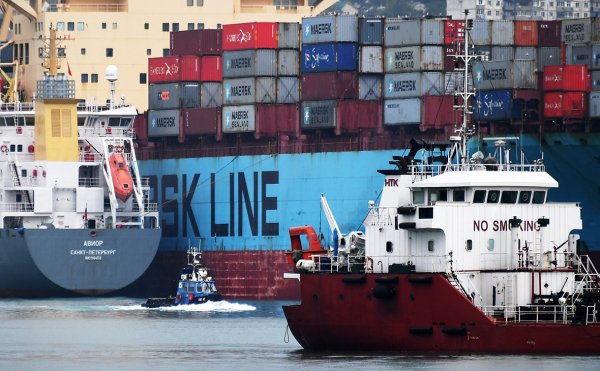
The dollar in payments for Russian exports to China in the first quarter of 2019 for the first time in the history of the lost leadership to other currencies, its share fell below 50%. Beijing went to meet the Russian fuel and Energy complex, transferring the payment in euros because of the sanctions.
 De-dollarization in the payment of the Russian export has occurred not in favor of national currencies and the Euro. The share of the European currency for the year has increased tenfold — from 0.7% in the first quarter of 2018 to 37.6% in the first quarter of 2019. To ruble calculations accounted for 9.6% of payments compared to 6.8% for the same period of 2018, into other currencies, including Chinese yuan — 7.1 versus 4.7 percent.
De-dollarization in the payment of the Russian export has occurred not in favor of national currencies and the Euro. The share of the European currency for the year has increased tenfold — from 0.7% in the first quarter of 2018 to 37.6% in the first quarter of 2019. To ruble calculations accounted for 9.6% of payments compared to 6.8% for the same period of 2018, into other currencies, including Chinese yuan — 7.1 versus 4.7 percent.
In the whole foreign trade of Russia and China (exports and imports of goods and services) the share of the dollar in the first quarter though declined dramatically, but are still covered more than half of the payments — 55,7% (or $14.7 billion of total turnover in the $26.4 billion), according to the RBC calculations based on data from the FCS and the Central Bank. Chinese imports to Russia are mostly still pays in dollars (66,5%).
Whoever rejects dollar
If you look at the current structure of trade, the Euro pass is mainly the suppliers of fuel and mineral resources — the main items of Russian exports to China, says Professor of the program “EMBA for Eurasia” business-school “SKOLKOVO” Oleg Remyga, noting the strengthening of the dynamics of care from the so-called petrodollar. The main item of Russian export, which China has increased the scale of payment in Euro, remains the export of crude oil, agrees chief analyst “BCS Premier” Anton Pokatovich. “In this plane work is carried out as in the direction of de-dollarization, and the preventive reduction of the risk of sanctions from Washington,” he says.
That Russian oil and gas companies put pressure on partners to be used for calculations in euros, not U.S. dollars, in November 2018, reported Reuters, citing industry sources. Pressure, according to them, has intensified in the run-up to 2019 when he discussed the details of the contracts for the following year. To prepare for the transition to payments in euros because of the sanctions, in particular, asked their customers “Surgutneftegaz” and “Gazprom Neft”, pointed out the Agency, and Rosneft introduced in the conditions of contract, demanding the payment of penalties if the payment is not made because of the sanctions.
RBC has asked the largest exporters of oil and gas in China information on whether they moved a portion of their contracts from dollars to euros. Gazprom, NOVATEK, “Gazprom Neft”, “Rosneft”, “Surgutneftegaz” and LUKOIL have not answered the questions RBC.
Data show that in the first quarter of 2019, Russian exports of goods and services by $6.3 billion was denominated in U.S. dollars. But Russia only crude oil supplied to China over the same period to $7,84 billion plus $1.17 billion of petroleum products (only $9 billion of energy). Thus, a significant part of trade in oil and oil products with China is not in dollars but in other currencies.
Why the Euro won national currencies
Growth is the share of the Euro in circulation in China is due to several reasons. The transition to settlements in national currencies (the yuan/ruble) are still difficult for exporters due to a lack of infrastructure, lists Oleg Remyga. While a relatively small number of Russian banks are ready to work with the yuan, the situation is similar with the Chinese banks. In addition, the Chinese financial sector is very widely treats US sanctions, with the result that Russian companies often face difficulties in operations, particularly in rubles, he added. Therefore, “the Euro has become a safe haven for carrying out foreign trade operations” between Russia and China: in Russia and in China, banks have the infrastructure to ensure payments in euros, and European banks hold correspondent accounts — accurately perform its obligations despite the sanctions, justifies Remyga.
The Chinese leadership against the background of trade wars and sanctions against Chinese companies are most interested in the fact that as far as possible away from dependence on the dollar, says the head of the Department investiga “BCS” Narek Avakian. That is, the de-dollarization of foreign trade activities is more of a forced step caused by foreign policy of the United States, he said.
Director of the Institute for international Economics and Finance Etta Alexander Knobel, does not exclude that in China the tendency to replace the dollar with the Euro will continue as these currencies are similar and for convenience, and liquidity, to substitute one for the other seems simple. It is unlikely that the replacement will be in the direction of the ruble and the yuan, he says, 75% of exports are primary resources, and where the calculations will be carried out mainly in reserve currency.
Despite the observed decline in settlements with major trading partners, the dollar’s share is still very high, says the head of monetary policy analysis and banking sector CMASF Oleg Solntsev. “We’ve been expecting it to slide, as dollar payments — a factor of vulnerability, in terms of sanctions,” he says, indicating that the step to replace the dollar in other currencies should have been done long ago.
© 2019, paradox. All rights reserved.





